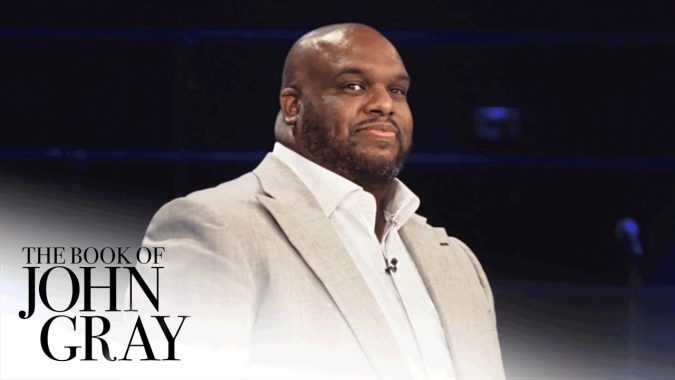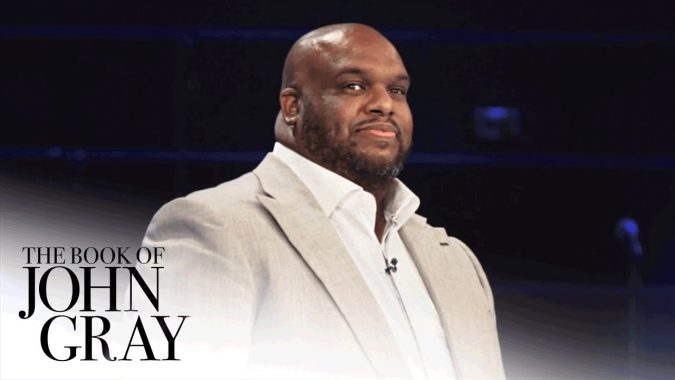This past season, the OWN Network premiered The Book of John Gray, a docu-series that followed the life of John Gray and his family. An associate pastor at Joel Osteen’s Lakewood Church, he works closely with wife, Aventer, both parents of two children, guiding their extended families and everyday people on personal challenges.
 Growing up in Cincinnati, Ohio, Gray was raised by a single mother when his parents divorced when he was young. Understanding the constraints of raising children on her own, Alicia Gray’s love never faltered. Their spiritual commitment was even stronger as Gray grew up—his earlier beliefs helped carry him. He would watch his mother extend a helping hand beyond cultural boundaries to the poor, constantly inviting unwed mothers and the homeless into their home.
Growing up in Cincinnati, Ohio, Gray was raised by a single mother when his parents divorced when he was young. Understanding the constraints of raising children on her own, Alicia Gray’s love never faltered. Their spiritual commitment was even stronger as Gray grew up—his earlier beliefs helped carry him. He would watch his mother extend a helping hand beyond cultural boundaries to the poor, constantly inviting unwed mothers and the homeless into their home.
Leaving home on a college academic scholarship, Gray soon returned home, devastated by his grandmother’s death. He began to do some soul-searching afterward, enrolling at The University of Cincinnati where he joined the school’s traveling Gospel choir. He would later join the cast in a musical tour starring Grammy Award-winning recording artist, Kirk Franklin, bringing together all of his talents through his spiritual faith.
Gray’s unique sense of comedy, acting and musical ability would land him roles on television shows such as Sister, Sister and clear the path to pursue his calling to minister.
He maintains a steady support system of mentors who have guided him, which includes Christian leader and author A.R. Bernard Christian and Dr. James L. Morman. The Defender caught up with Gray as he wrapped up a successful season one of his new television show on OWN.
For those who aren’t familiar with the first season of The Book of John Gray, what kind of topics does the series address?
This show is about the intersection of faith and humanity; you have a very real family where faith is our foundation. What makes it unique is that each week we are constantly introduced to new people who are walking through new challenges and new difficulties, but they are committed to the process, and my wife and I get to walk with people through real challenges outside of the four walls of the church. I think that’s what makes the show unique; we’re meeting people where they are.
Isn’t that pretty much a normal process for most people when they have to deal with day-to-day challenges and obstacles — to reach beyond a higher power for that foundation?
The truth is westernized Christians in many places are very insular and they don’t reach outside of themselves very often. Most people revert to their comfort zones. It’s very easy for churches to say, ‘Come to where we are,’ but very few are active in the community or reaching outside of those four walls; not necessarily the people who are members, but people who are believers.
We encounter people who have some faith, no faith or faith in another power. My issue and my calling are to be faithful and to be honorable to that which I adhere to while honoring other people’s right to feel what they feel. But if there’s something of value that I can give, and I do, when you talk about the challenge — there are some people who don’t believe in anything other than themselves. So, we’re in an age of moral relativism and secular humanism; we’re in an era now where people are screaming ‘live your truth.’
In many segments of American society, faith is a dinosaur, and that’s just what it is. Too many people have used the church as a bully pulpit for particular agendas, and for some who have attempted to manipulate or shame people into changing, it has become a negative connotation.
I believe with this show, it’s about just showing one family’s journey as we walk out our faith authentically but also walk with people who are in real challenging situations because we’re very normal people and we’re super normal, but we do believe in a supernatural God, and I make no apologies for that.
 Give me an example, Pastor Gray, of how your outreach has affected people who you and your wife have helped outside of the four walls of the church?
Give me an example, Pastor Gray, of how your outreach has affected people who you and your wife have helped outside of the four walls of the church?
We are helping a family; a husband and wife, who are struggling to conceive. They had a child, and it’s a miracle little girl, but the mother wants more children, and the father is kind of okay either way. But they had spent thousands of dollars on in vitro fertilization, and there was a lot of stress and pressure on the marriage, which affected their intimacy. We talked with them, and we walked with them—my wife walked a lot closer with the wife than I did and I spent time with the husband understanding his heart.
My job as a pastor, and as a father, is to say, ‘I know you guys want more kids’ but there’s a miracle living in your house right now. We also pray, so, at the end of the episode, it turns out they’re now pregnant with twins.
We also talk about what it means to be a young African-American man, the necessity of your education, your moral center, what it means to go after your educational goals, and the realities of the unbalanced playing field. We deal with weight and diabetes. So, it is a broad spectrum of things.
What are some things that you want viewers to walk away with?
I want people to know that there are no accidental lives. You can’t sneak into the earth; you have to be spoken into the earth. I believe that God created every human being with the exact same value. Every person that we encounter has a touch of the Divine. Do people do wrong things? Absolutely. Do people make horrible decisions? Yes. That’s called free will, but there are also people who do great things, and unexpected things that are a part of what I believe are God’s tapestry and the mosaic of humanity. I want people to know that no challenge or issue is beyond their ability to overcome. These are altruistic ideals, but I also think for a man of faith that it is a moral necessity that we honor the gift of life by speaking life to everybody and honoring people; whether they honor us or not. We must do it without manipulation, and we must do it without apology.
Follow Mary L. Datcher on Twitter



